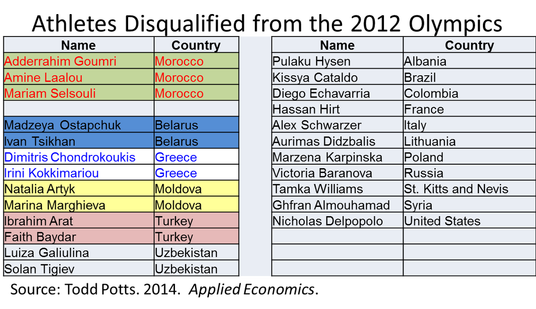Potts located his article in the literature that examined the implications of communism/capitalism for Olympic success. In this literature, the communist countries has a statistically better chance of winning medals. Interestingly, Potts tends to find the opposite - a fact he attributes to the limited number of communist countries in his data set. Rather than focus on overall indicators of governance, like communist/capitalist, Potts uses the set of World Governance Indicators published by the World Bank. He also limits his medal performance to the 2012 London summer Olympic Games.
Potts presents results for a range of model specifications. He also includes data on participation, GDP, and climate. He finds that countries from a temperate climate have a better chance of winning a medal. One wonders what this variable captures given that many athletes from temperate climates travel to warmer climates for training purposes. Hosting the games and GDP were associated with greater medal prospects.
According to Potts, half the athletes at the 2012 games were tested for banned substances. Only twenty-four athletes, from seventeen countries, were disqualified. The list is reproduced below. To check the robustness of his results, Potts extended his analysis using the IAAF list of 255 athletes "currently" banned from competitions. The results are consistent with the narrower 2012 games data. Again it is interesting to note that communist countries (China) are less likely to win a medal and less likely to have athletes disqualified.

 RSS Feed
RSS Feed